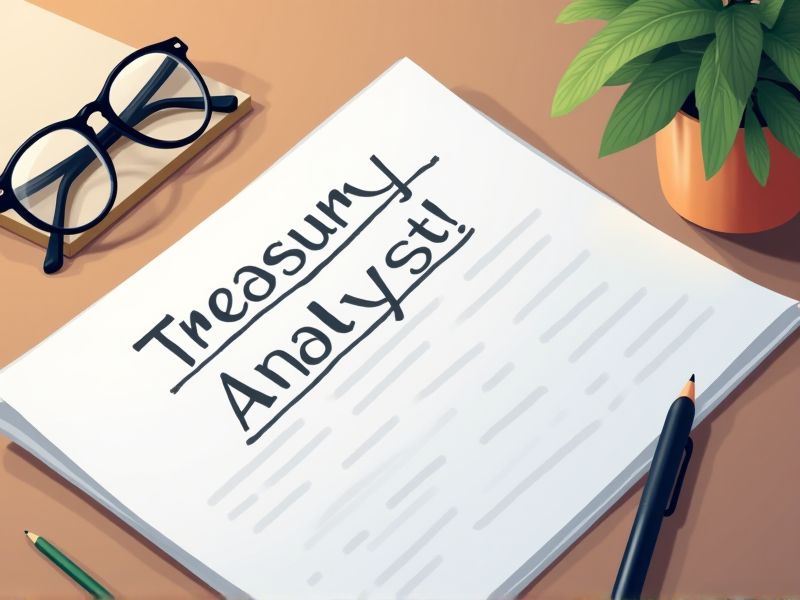
Treasury Analysts manage financial assets, requiring deep knowledge of cash management and risk assessment. Certifications provide validated expertise, enhancing analytical skills and boosting credibility in the financial sector. They help professionals navigate complex regulations and industry standards effectively. Here are some important certifications essential for a Treasury Analyst.
Certified Treasury Professional (CTP)
Obtaining a Certified Treasury Professional (CTP) credential demonstrates a treasury analyst's expertise and understanding of key financial concepts, which can lead to career advancement. The CTP certification equips analysts with comprehensive knowledge of cash and liquidity management, risk management, and corporate finance. Employers recognize the CTP as a benchmark of excellence, often preferring certified individuals for higher-level roles. This credential also supports networking opportunities within the treasury field, enhancing career prospects and industry connections.
Chartered Financial Analyst (CFA)
The Chartered Financial Analyst (CFA) designation equips a Treasury Analyst with comprehensive investment analysis and portfolio management skills, enhancing their ability to optimize financial resources. Complex financial instruments and risk assessment become more manageable, leading to more informed decision-making. Employers often view the CFA credential as a mark of high ethical standards and commitment to the field, increasing an analyst's professional credibility. A Treasury Analyst with a CFA can better navigate global financial markets, which is critical in managing corporate liquidity and capital.
Certified Public Accountant (CPA)
A Certified Public Accountant (CPA) is often necessary for a Treasury Analyst as they bring a deep understanding of financial regulations and compliance that is paramount in managing organizational funds. Their expertise in accounting principles ensures accurate forecasting and analysis of cash flows, which is crucial for strategic decision-making. With the CPA's proficiency in auditing and risk assessment, organizations can maintain financial integrity and identify potential financial risks ahead of time. The CPA designation enhances credibility, instilling confidence in investors and stakeholders regarding the company's financial health.
Certified Management Accountant (CMA)
A Treasury Analyst manages an organization's financial activities, and having a CMA helps them apply advanced financial management and strategic expertise. The CMA certification provides skills in budgeting and cost management, critical for optimizing cash flow and liquidity. Proficiency in financial analysis, critical in evaluating investment opportunities, is strengthened by CMA training. CMAs are equipped with ethical guidelines and compliance standards, reducing risks associated with financial mismanagement.
Financial Risk Manager (FRM)
A Treasury Analyst manages an organization's liquidity and requires accurate risk assessments, which an FRM provides. Effective risk management by an FRM enables the Treasury Analyst to make informed decisions on investment strategies. The FRM identifies potential financial threats, ensuring the organization's capital is preserved. Hiring an FRM helps the Treasury Analyst align their actions with regulatory compliance and industry standards.
Certified Fraud Examiner (CFE)
The complexity of financial transactions and the high potential for fraud necessitate a Certified Fraud Examiner (CFE) within a Treasury Analyst team to identify and mitigate risks effectively. A CFE enhances the organization's ability to uncover and address fraudulent activities that could impact financial statements. Their expertise prevents financial loss and supports legal compliance by recognizing suspicious patterns early. CFEs strengthen internal controls, therefore safeguarding the organization's financial integrity and reputation.
Certified Financial Planning & Analysis (FP&A)
Certified Financial Planning & Analysis (FP&A) is crucial for a Treasury Analyst because it enhances forecasting accuracy, improving cash flow management. In-depth FP&A skills enable the analyst to execute strategic financial planning effectively, driving more informed decision-making processes. Expertise in FP&A supports risk assessment, helping to mitigate financial uncertainties and protect organizational assets. The certification strengthens analytical abilities, ensuring comprehensive evaluation of budgetary implications and capital allocation.
Financial Modeling & Valuation Analyst (FMVA)
Treasury analysts need robust financial modeling and valuation skills to accurately forecast cash flow and manage liquidity, ensuring optimal allocation of resources. The FMVA certification equips them with advanced modeling techniques, which are crucial for evaluating investment opportunities and enhancing risk management strategies. Proficiency in valuation methods aids treasury analysts in assessing the financial impact of strategic initiatives and financing options. Certified analysts contribute to informed decision-making processes, improving the organization's financial stability and resilience in variable market conditions.
Certified Investment Management Analyst (CIMA)
The Certified Investment Management Analyst (CIMA) designation equips Treasury Analysts with advanced portfolio construction skills, enhancing their abilities to manage a company's liquidity and investments. By understanding sophisticated investment strategies, Treasury Analysts can make more informed decisions that align with the organization's financial goals. CIMA certification provides insights into risk management techniques, helping analysts mitigate potential financial risks in volatile markets. The specialized knowledge gained through CIMA supports better communication with stakeholders about investment strategies, improving trust and collaboration.
Certificate in International Treasury Management (CITM)
A Certificate in International Treasury Management provides a Treasury Analyst with a structured understanding of global financial operations, essential for efficient cash and risk management. Knowledge gained from CITM empowers professionals to navigate complex international regulations, crucial for compliance in diverse markets. Analytical skills acquired through the program enhance decision-making, leading to optimized working capital and investment strategies. In an increasingly interconnected financial world, a CITM distinguishes analysts as competent in aligning treasury functions with multinational corporate strategies.
Summary
As a Treasury Analyst, obtaining certifications can enhance your skills and increase your competitiveness in the job market. Certifications often lead to deeper knowledge in financial strategies and risk management. Employers frequently recognize certified professionals as being more proficient and committed to their career development. This may result in improved job performance, career advancement opportunities, and potentially higher salaries.
